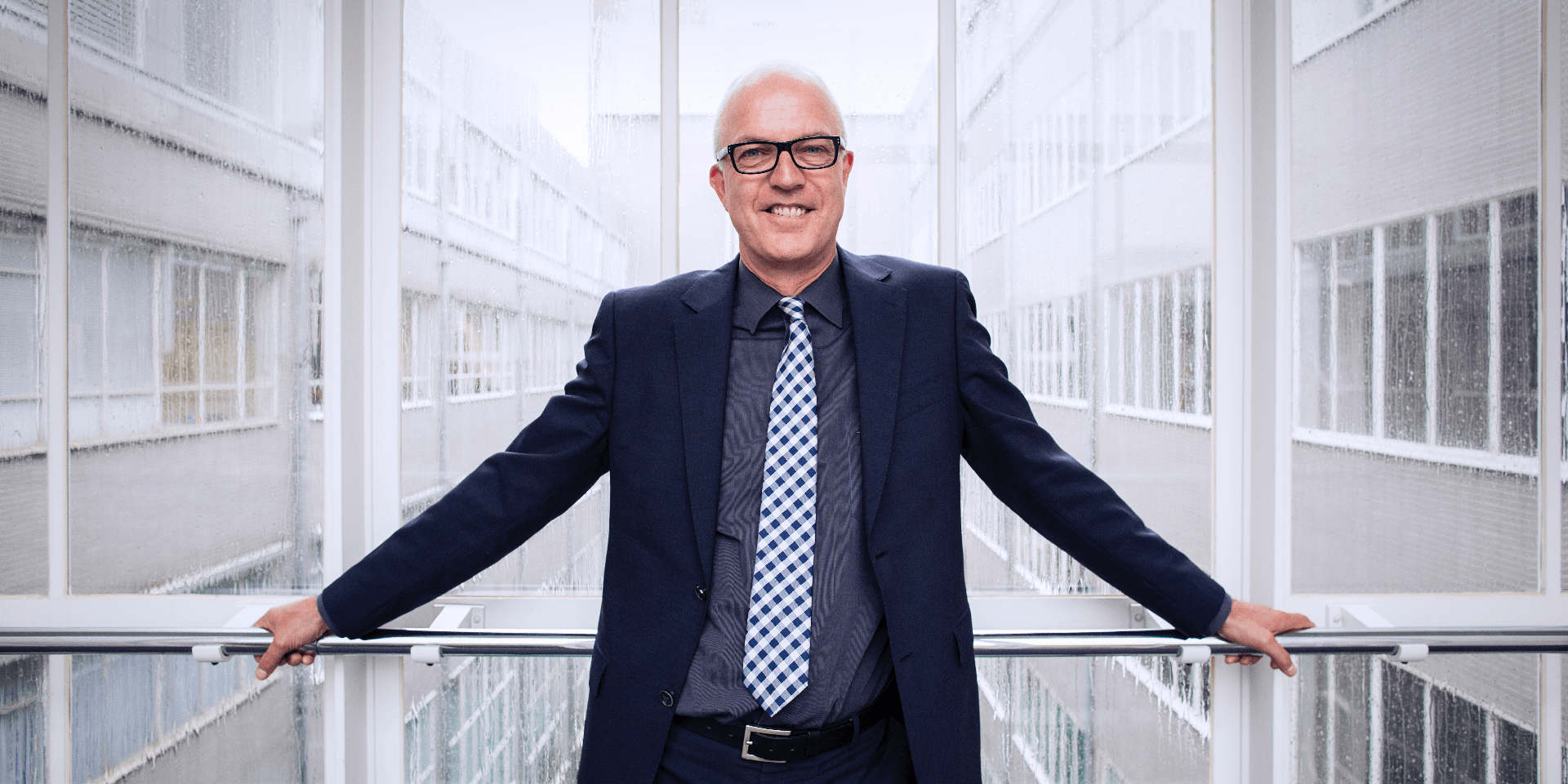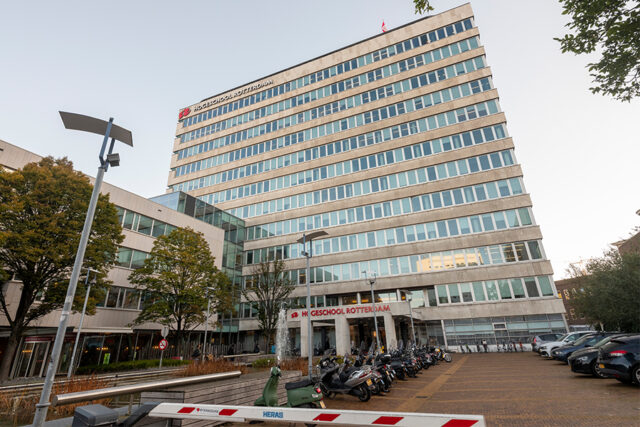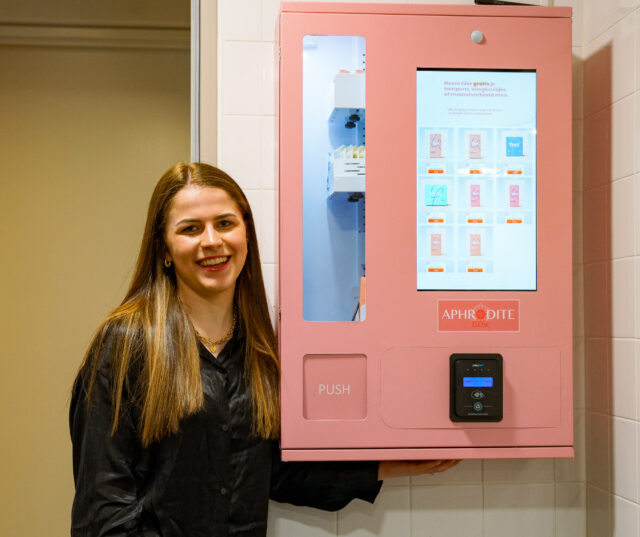Interview with Ron Bormans: The University of Applied Sciences is like a village within the city
Gepubliceerd: 29 August 2016 • Leestijd: 9 minuten en 46 seconden • English Dit artikel is meer dan een jaar oud.How are things at Rotterdam University of Applied Sciences after four years with Ron Bormans? And what kinds of plans does the President of the Executive Board have for the coming years?

Since his reappointment, Ron Bormans may rule over the Rotterdam University of Applied Sciences for another four years. ‘This is the place I want to be. With all of the major issues at hand, this is where I feel I belong.’
One of these ‘major issues’ has to do with the future of the University of Applied Sciences. According to Bormans, study programmes should be responsible for designing their own education systems. However, this perspective raises questions regarding the overall role of the university itself.
With this question in mind, Bormans took a sabbatical in June. This question eventually led to a vision where Rotterdam University of Applied Sciences is like a village within the city, with an Executive Board that protects values such as equality and tolerance.
Profielen met with Ron Bormans, on the one hand to talk about this vision, but also to look back on the last four years and examine seven statements he has made in the past.
‘We’re not doing well enough.’ January 2013
‘I would dare to repeat this statement. When I started, several study programmes were inadequate. Several were so bad that I was rather ashamed of them. I drew up the Focus Policy in order to hold up a mirror to the school. The Focus Policy focused on 3 subjects: 1. We are a school, which means we educate; 2. We focus on Bachelor education, and 3. We are going to be better at it.
‘The study programmes that were so bad at that time are doing much better these days. Now it is time to grow towards ‘good’ and also to improve study performance and success, because we have actually been getting worse in that area.
‘I have examined the study programmes that outperform the rest. Some colleagues tried to explain that Rotterdam was complicated, as if that was an excuse for not doing well. But that isn’t true for all the programmes. Some are doing very well nationally. Take, for example, the Industrial Product Design, Electrical Engineering, or Geography Teacher Training programmes. These are study programmes with a clear cohesion in the lecturer teams and lecturers dare to give one another critical feedback. Together, they decided that things could be better and they worked to make those improvements. I respect that.
‘We need to support and facilitate these developments. I believe that you learn well in a structured environment. That you shouldn’t be distracted by things like scheduling problems. We haven’t resolved all of these problems, but do I see that study programmes are starting to discover how things actually work. By scheduling courses less strictly. Or offering fewer courses at the same time, as we can see happening in some of the Economics study programmes. When studying starts becoming more or less predictable and you can stop worrying about the framework procedures, you can focus all your attention on content and contact with the lecturer.’
‘These people have come up with the initiative themselves. That illustrates a degree of commitment.’ July 2015
‘This has to do with the ‘nominal is normal’ experiment conducted by the School of Commercial Management Studies where everyone in the first year of study had to achieve 60 points. This wasn’t my idea — I support 48 or 52 points—but I defended it with a passion. When working towards good education, it is more important to have the lecturers’ dedication than to have them do what I want.
‘I believe that every lecturer and each team should have a large measure of professional freedom, but they should also continue to ask themselves, with some amount of strictness: Are we doing things well enough? As the Board, we need to pursue this as well, also because I’ve noticed that people find it difficult to translate this question into their professional actions. I understand this because education is a personal matter. When you teach, you put yourself out there. And if what you are doing is not the right thing, that means you’re not doing it correctly.’
‘Without a transition year between MBO and HBO, some students don’t stand a chance.’ April 2016
‘I have criticised this issue heavily over the past few months and I have wondered out loud if we know our students well enough. I doubt that we do based on the high percentages of dropouts that we experience among MBO students from ethnic minority groups.
‘When I see the numbers, I think: That can’t possibly be the case in Rotterdam? This realisation has to sink in, both inside and outside our University of Applied Sciences. One of my roles is to keep communicating this point, even to the point of hammering on about it.’
‘To instigate discussion, I came up with the following scenario. As you walk down the hallway, you can see a lecturer in conversation with three nice-looking blond girls who are actively participating in the class. In the back, you see three boys, slouching in their seats, caps still on their heads. Which of these two groups will still be in school at the end of the year? The answer seems clear to me.’
‘That is not because we have racists teaching at our school. That’s nonsense. There are some racists in Rotterdam so we probably have a few too, but the majority is not racist. The lecturer is simply trying to teach and perhaps he/she does this with cultural bias. And perhaps the lecturer feels more challenged by a particular group of students because this is a group that they never have contact with, except when they are in the back of their classroom. However, it is important for lecturers to want to understand these guys. That is pedagogy. My story is very simple.’
‘My plan for an obligatory transition programme has as of yet been rejected by the Minister but we are going to meet with her staff soon to see if there isn’t room for it somewhere. I hope there will be because there is no other alternative. With voluntary measures, such as a summer course, you don’t reach the group in the way that is necessary. I want to be able to tell MBO students who are at the greatest risk of not succeeding that they will only be admitted if they do the transition programme. If we don’t do this, it is misleading to tell the group: you have a chance with us. I won’t give up on this topic, even if we don’t come to an agreement with the Minister. In such a case, the next step is the cabinet formation.’
‘Add some more attitude, dare to be bolder.’ December 2014
‘I made this statement to the Student Advisory Board because I felt they should be more critical in their dealings with us. Contradiction is good. It seems that people aren’t naturally critical towards me. I always tell people not to pay attention to this. Still, people find it difficult since I’m the boss. I realise that in my position I can say, ‘Go on, be free; take responsibility!’ but even that can be seen as intimidating and forceful.’
‘I’ve learned that I can be so eager that it can be intimidating to others.’
‘This is also a topic for conversation among the Board. We discuss each other’s actions and sometimes we invite someone from outside to attend. I can lead these discussions as the President, but that immediately creates a hierarchy that we don’t want for these types of meetings. The outsider can give us insight as to whether we are adequately critical towards one another.’
‘These meetings have shown me that I can be so eager that it can be intimidating for others. I pull all the attention towards myself, making the playing field smaller for the others. Since discovering this, I make an effort to go by Board member Jan Roelof’s office once in a while and ask, ‘Jan, did I over-do it again?’ Then Jan gives me the eloquent answer, ‘Yes, a little bit.’ Enough said.’
‘After Paris we should be talking, talking, talking.’ November 2015
‘After all the attacks last year, people were having a difficult time, including people from a Muslim background. I think it’s important to let them know that they have a place at school, that as Rotterdam youth, they are welcome here. This message can only be communicated if we talk with one another.’
‘We need to talk a lot more. If someone is spouting nonsense about the persecution of the Jews or about Muslims, that is often considered someone’s opinion. Nonsense. These are cases of factual misrepresentations and people need to be brave enough to confront them.’
‘Every lecturer, every team needs to ask themselves daily, ‘Are we doing well enough?’
‘This is a subject that occupies a great deal of my time because I believe it’s an important part of the whole subject of educational success. I think that many young people step into a brand new world when they come here to study. Again, you get confronted with society’s values and morals. If we collectively throw away a certain category of guys – towards the other side of the Maas, for example – then they will begin to look for their identity there. And then they will only confirm the Us versus Them mentality, and perhaps in an aggressive way. In this way, we contribute to creating a foundation for radicalisation. And, yes, I do mean to state it that harshly.’
‘If our University of Applied Sciences isn’t seen as a home for Rotterdam youth in its broadest sense, then it becomes a segregation machine instead of an institution for education. We then facilitate radicalism instead of fighting it. That’s what this ‘talking’ is all about.’
‘A single party doesn’t result in a closer connection – I don’t believe that at all.’ October 2013
‘I’ve done away with the student party BEATS010. Of course this kind of party is great fun and can lead to a temporary feeling of connection, but let’s not act as if it leads to any sort of long-term connection to the University or the study programme. I’m looking for the kind of connection that happens in the classroom. As a student, you need to feel connected to a group of lecturers who challenge you, who correct you, and who pull you back in line when you’re on the wrong track. When a lecturer sees the latter happening, they shouldn’t say, ‘That’s something for the study career coach, the student counsellor, or mentor to deal with.’ No, this needs to happen in the classroom.’
‘If our University of Applied Sciences isn’t seen as a home for Rotterdam youth in its broadest sense, then it becomes a segregation machine instead of an institution for education.’
‘And student associations? You can create an atmosphere of connection for students who are part of a study programme. Organising events around this concept does appeal to me.’
‘I would like it if we could create close learning environments for all our study programmes— environments that reflect the feel of the study programme. That, when it smells like a hospital, you know you have arrived at the Nursing Programme. Or, look at that wonderful Willem, the bar that goes with the Willem de Kooning Academy. If this makes people want to come to school, I understand that. And I want them to come to school, I don’t really like distance learning. There is simply a different pedagogic climate at home than at school.’
‘What will the University of Applied Sciences look like in 25 years, in its style of management and interconnection with society?’ June 2016
‘I wrote this in a blog about my sabbatical last June. With the help of some books others recommended to me, I have found legitimisation for the university of applied sciences of the future. A university of applied sciences doesn’t just offer study programmes, but it is also a community that strives towards a number of basic values, like democracy and tolerance, citizenship, and respect for religion. With this concept, we create for young people a kind of village within the city. The core is the study programme, but the fact that you are also part of a village is meaningful as well. Sharing and talking about values could be a task for municipal government, but I believe that the municipality of Rotterdam would be incredibly happy if other institutions were to helped out. This, in short, is my idea of legitimisation, the topic that I’ve written a 40+ page essay on.’
‘I believe that you learn well in a structured environment. Scheduling problems are distractions.’
‘A way further-reaching form of de-centralisation and de-regulation characterises the new university of applied sciences. I don’t mean an absence of rules, but I believe we have to clear out all of the unnecessary, nonsense rules and regulations. People often say to me, ‘The things you want to do are not allowed due to the collective agreements of the Rotterdam Educational Model (ROM).’ ‘I happen to know those documents by heart and this subject isn’t in them. I mean, sometimes we’re talking about actual regulations and sometimes it refers to the type of rules people have in their minds. The ROM is a great starting point, but the way that we implement it should be left up to the lecturers. I’m not going to prescribe things like numbers of ECTS or how many hours go into study career coaching. That leads to machine bureaucracy and professionals that feel shackled.’
‘This leads me to a study programme like Nursing. If you look at it, it is a very different study programme than four years ago. Different in results, different in the way people take responsibility for things. It’s a good example of a group that said, ‘We don’t want things to continue as they are now.’ That leaves me feeling optimistic for the future.’
Text: Jos van Nierop and Tosca Sel
Photography: Frank Hanswijk









[…] with Ron Bormans: The University of Applied Sciences is like a village within the city http://profielen.hr.nl/2016/interview-with-ron-bormans-the-university-of-applied-sciences-is-like-a-… […]